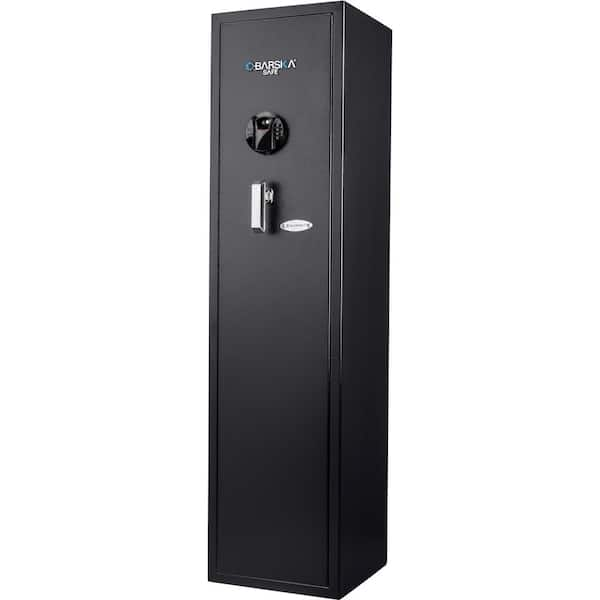Choosing the right battery for your biometric rifle safe is more important than you might think. Your safe’s reliability depends on it, especially when every second counts.
Imagine needing quick access to your firearm and the battery fails. That’s a risk you don’t want to take. You’ll discover which battery type keeps your biometric safe working smoothly and why it matters for your security. Keep reading to make sure your rifle safe is always ready when you need it most.

Battery Options For Biometric Rifle Safes
Choosing the right battery for a biometric rifle safe matters. It affects how well the safe works and how often you replace the battery. Different battery types offer different benefits. Some last longer, while others cost less or are easier to find. Understanding these options helps you keep your safe ready and secure.
Alkaline Batteries
Alkaline batteries are common and easy to buy. They work well in most biometric safes. These batteries provide good power for a fair price. They usually last several months under normal use. Changing them is simple, making them a popular choice.
Lithium Batteries
Lithium batteries last longer than alkaline ones. They perform better in cold or hot weather. These batteries cost more but offer reliable power over time. They reduce the need for frequent replacements. Lithium batteries keep your safe ready in tough conditions.
Rechargeable Batteries
Rechargeable batteries save money over time. You can recharge them many times before replacing. They are eco-friendly and reduce waste. Some biometric safes support rechargeable battery packs. Charging requires access to power, so plan for this need.

Performance Factors To Consider
Choosing the right battery type for a biometric rifle safe depends on several key factors. These factors affect how well the safe works and how long it lasts. Understanding these points helps you pick a battery that keeps your safe reliable and ready.
Battery Life And Longevity
Battery life is how long the battery can power your safe before running out. A longer battery life means fewer changes and less worry. Look for batteries that last many months or even years under normal use.
Longevity also means how well a battery holds its charge over time. Some batteries lose power quickly even when not in use. Choose batteries known for holding charge during storage.
Power Consistency
Power consistency means the battery delivers steady voltage to the safe. Fluctuations can cause the safe to malfunction or slow down. Good batteries provide stable power from start to finish.
Batteries with strong, consistent power help the biometric scanner work fast and accurately every time. This is very important for quick access when needed.
Temperature Tolerance
Biometric rifle safes may be kept in places with changing temperatures. Some batteries lose power or stop working well in cold or hot conditions. Choose batteries that handle temperature changes without dropping performance.
Temperature-tolerant batteries keep your safe working no matter the weather. This helps protect your rifle and ensures access anytime.
Compatibility With Biometric Systems
Choosing the right battery for a biometric rifle safe is not just about power. The battery must work well with the biometric system inside the safe. Compatibility ensures the safe opens quickly and correctly every time. It also keeps the sensor working accurately without errors.
Voltage Requirements
Biometric systems need the correct voltage to function. Too high or too low voltage can harm the sensor. Most safes use 9-volt or AA batteries. Using the exact voltage keeps the fingerprint sensor stable. It prevents false readings and delays in opening the safe.
Battery Size And Fit
The battery must fit snugly inside the safe’s compartment. A loose battery can disconnect and cause the safe to lock. Many safes have small, specific battery slots. Using the wrong size can damage the compartment or cause poor contact. Always check the safe’s manual for the right battery size.
Impact On Sensor Accuracy
Battery power affects how well the sensor reads fingerprints. Low battery power can cause slow or failed scans. Fresh batteries help the sensor detect prints quickly and clearly. Consistent power supply reduces errors and improves the safe’s security. Regular battery checks keep the sensor working at its best.

Cost And Availability
Choosing the right battery for a biometric rifle safe depends a lot on cost and availability. These factors affect how easy it is to keep your safe powered. You want a battery that fits your budget and is easy to find in stores or online. The cost includes not just the price of the battery but also how often you need to replace it. Availability matters too, especially in urgent situations when you need a quick replacement.
Initial Cost Vs Long-term Expense
Some batteries cost less at first but need frequent changes. Others cost more upfront but last longer. Cheaper batteries might seem good at first. But buying them often can add up over time. Higher-priced batteries that last longer can save money in the long run. Think about how often you want to buy new batteries before choosing.
Ease Of Replacement
Batteries that are easy to replace save time and hassle. Common battery types like AA or AAA are simple to find and swap out. Specialty batteries might be harder to get and take longer to change. If the battery is inside a tight space, easy replacement is even more important. Choose a battery type that fits your routine and comfort level.
Environmental Impact
Some batteries contain harmful chemicals that harm the planet. Rechargeable batteries reduce waste by lasting through many uses. Disposable batteries create more trash and pollution. Picking eco-friendly batteries helps protect nature. Consider batteries that balance power, cost, and environmental care for your safe.
Safety And Maintenance Tips
Safety and proper maintenance help your biometric rifle safe work well for years. Batteries play a big role in this. You must handle them carefully to avoid damage or accidents. Follow these tips to keep your safe and batteries in good shape.
Proper Storage Of Batteries
Keep batteries in a cool, dry place away from direct sunlight. Avoid storing batteries near metal objects to prevent short circuits. Store batteries at room temperature to maintain their power and lifespan. Use original packaging or a battery case for extra protection. Check batteries regularly for any signs of damage.
Signs Of Battery Failure
Watch for slow or unresponsive biometric scanner actions. The safe may not open quickly or at all. Batteries may leak or swell, indicating a problem. Check for corrosion or discoloration near the battery compartment. Replace batteries immediately if any of these signs appear to avoid safe lockouts or damage.
Safe Disposal Methods
Never throw batteries in the trash. They contain harmful chemicals that can hurt the environment. Take used batteries to a recycling center or a designated drop-off point. Follow local regulations for battery disposal. Use battery recycling programs to keep your community safe and clean.
Recommendations From Experts
Experts agree that choosing the right battery for a biometric rifle safe is crucial. The battery powers the lock system and affects the safe’s reliability. Low-quality batteries can cause malfunctions or sudden power loss. Experts suggest focusing on battery life, reliability, and availability. These factors ensure the safe works smoothly over time.
Top Battery Picks
Many experts recommend alkaline batteries for biometric safes. Alkaline batteries offer long-lasting power and stable voltage. Lithium batteries also rank high for their extended life and performance in cold weather. Rechargeable NiMH batteries appeal to those wanting eco-friendly options. Still, they may need frequent charging. The best choice depends on your usage and environment.
User Experience Insights
Users report that alkaline batteries rarely fail during critical moments. They appreciate the easy availability in stores worldwide. Some users prefer lithium batteries for safes kept in cold places. Rechargeable options get mixed reviews due to shorter runtime between charges. Most users advise keeping spare batteries handy to avoid lockouts.
Manufacturer Suggestions
Manufacturers often recommend specific battery types for their safes. Many design their locks to work optimally with alkaline batteries. Some models require lithium batteries for better sensor accuracy. Always check the user manual before choosing batteries. Using recommended batteries preserves warranty and ensures safe operation.
Frequently Asked Questions
What Battery Type Is Best For Biometric Rifle Safes?
Lithium AA batteries are best for biometric rifle safes. They offer long life and reliable performance in cold or hot climates. Lithium batteries reduce the risk of corrosion and ensure the safe’s electronic lock works without interruption.
How Often Should I Change Biometric Safe Batteries?
Change batteries every 12 to 18 months or when the low battery indicator activates. Regular replacement prevents lockouts and maintains optimal safe functionality. Always use high-quality batteries for consistent performance.
Can Rechargeable Batteries Work In Biometric Rifle Safes?
Rechargeable batteries can work but are not ideal. They often have lower voltage, which may affect lock sensitivity. Non-rechargeable lithium batteries provide more stable power and longer usage time for biometric locks.
What Are Signs Of Low Battery In Biometric Safes?
Signs include slow lock response, warning beeps, or flashing lights on the keypad. Some safes display a low battery icon. Replace batteries promptly to avoid lock failure or access issues.
Conclusion
Choosing the right battery for your biometric rifle safe matters a lot. Alkaline batteries last longer and work well in cold weather. Lithium batteries offer even more power and last the longest. Rechargeable batteries can save money but may need frequent charging.
Always check your safe’s manual for battery type recommendations. Keep spare batteries handy to avoid lockouts. The best battery keeps your safe secure and ready to use. Simple choices make a big difference in safety and convenience.

